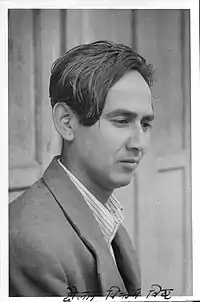Daulat Bikram Bista
Daulat Bikram Bista (Nepali:दौलत विक्रम विष्ठ) was a writer and poet of Nepali literature. He was born on 9 October 1925 (6 Asoj 1983 B.S.) in Bhojpur and passed away on 1 January 2002. His writing deals with the social issues mainly the exploitation and discrimination to the poor and down trodden people.
Daulat Bikram Bista | |
|---|---|
 | |
| Native name | दौलत विक्रम विष्ठ |
| Born | 9 October 1925 Bhojpur, Nepal |
| Died | 1 January 2002 Nepal |
Personnal life
Bista was the first son of Somraj Bista (father) and Man Kumari Bista (mother). His ancestral house is in Lamjung but his father had migrated to Kathmandu before he was born to get a government job. Bista was born in Lamjung due to transfer of his father to Lamjung during the job. Bista lived in various cities while accompanying his father's job was transferred. His mother died in 1996 after which his father married the second wife. The step siblings are Shankar, Gopal, Manda and Mithu.[1]
Bista married at the age of 19 with Lichu (daughter of Premlal Pandey). But the wife gave birth in first three months of marriage which lead to informal divorce. Later Bista married to Nutan Kumari (daughter of Bhaktaman Basnet). He had six children, four sons and two daughters. The son are Shree Bikram, Om Bikram, Kailah Bikram and Ananta Bikram. His daughters are Indira and Niru.[1]
His wife died in 2054 BS which lead to a difficult life for him. He died in 13 Poush 2059 BS.[1]
Education
Due to travelling nature of his father's job, he studied in various schools in different part of Nepal. He studied at Gurukul in Salyan, Goswara Munsi in Jhapa, government schools in Jhapa, Durbar High School in Kathmandu.
He completed his high school in 2004 BS and studied BA and B.Ed. in Tribhuwan University. He also has complted masters study from Aligarh university of India as a private student.[1]
Works
His first novel Manjari was published in 2015 B.S. It is a social novel based on the changes brought by the 1951 revolution. Manjari reveals the social and cultural outlook and practices of that time.
His second novel Ek Paluwa Anekau Yam is a fiction and considered to have a greater novelistic quality.
The Bhok ra Bhittaharu, published in 2038 BS, is considered to be a mixture of comic, sentimental, emotion and the relationship of Father and Daughter.[2]
Other major works of Bista are:[3]
- Chapaiyeka Anuharharu (Emaciated Faces)
- Jyoti Jyoti Mahajyoti (Light of Lights)
- Thakeko Akash ( An Exhausted Sky)
- Bigriyeko Bato (Spoiled Path)
- Bhok Ra Bhittaharu (Hunger and Walls)
- Baluwa Mathi ( On The Sand)
- Himal Ra Manche (Himalaya And A Man)
- Fasiko Fandama
Awards
Bista received various awards for his writings by the government and non-government organizations. Some notable ones are listed below:
- He was the first awardee of Mahendra Pragya Puraskar in 2030 B.S. for his novel Chapaiyeka Anuharharu
- Madan Puraskar in 2045 B.S. for his novel Jyoti Jyoti Maha Jyoti [4]
- Sajha Puraskar for Ashu tesai tesai Chhahchalkincha(आँसु त्यसै त्यसै छचल्किन्छ)[5]
- Tri Shakti Patta
- Order of Gorkha Dakshina Bahu - fourth.
- Jansewa Padak
- Durgam Sewa Padak
References
- "दौलत विक्रम विष्ट र उनको साहित्यकारिताको आकलन www.samakalinsahitya.com". Retrieved 2020-11-10.
- "Bhok Ra Bhittaharu". Himal Radio. 2019-08-15. Retrieved 2020-11-10.
- "Monographs – Madan Puraskar Pustakalaya". Retrieved 2020-11-10.
- "दौलतविक्रम विष्ट Daulat Bikram Bista ,WRITING NEPAL — Books, Writings, Authors, Publisher, Writers and Blogger - All in One Place. — Just Write !". Retrieved 2020-11-10.
- Shrestha, N.R. (2017). Historical Dictionary of Nepal. Historical Dictionaries of Asia, Oceania, and the Middle East. Rowman & Littlefield Publishers. ISBN 978-1-4422-7770-0.